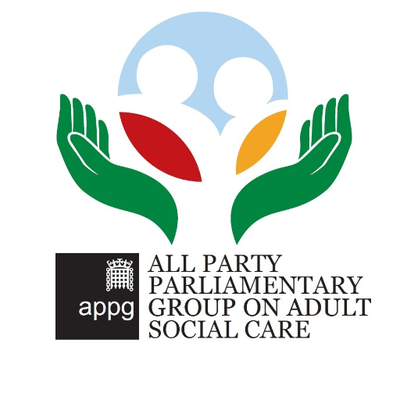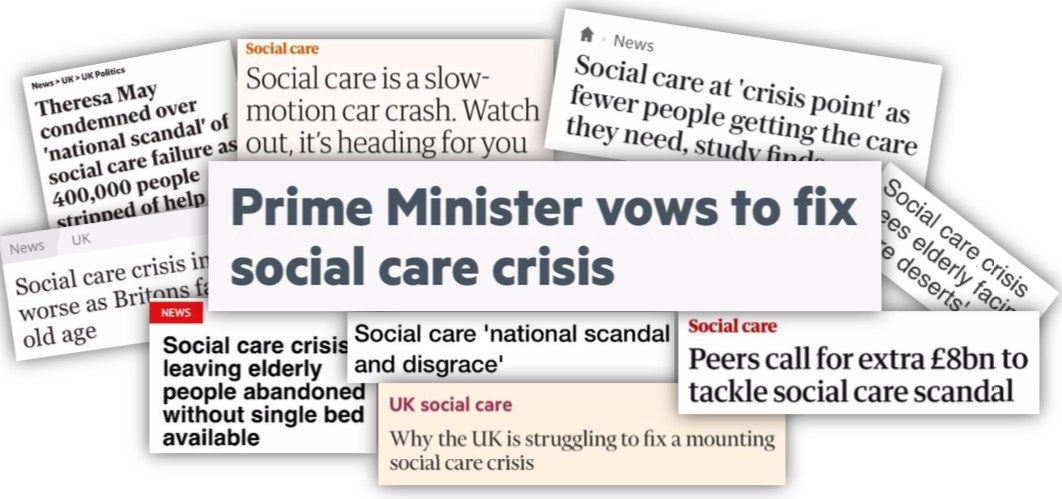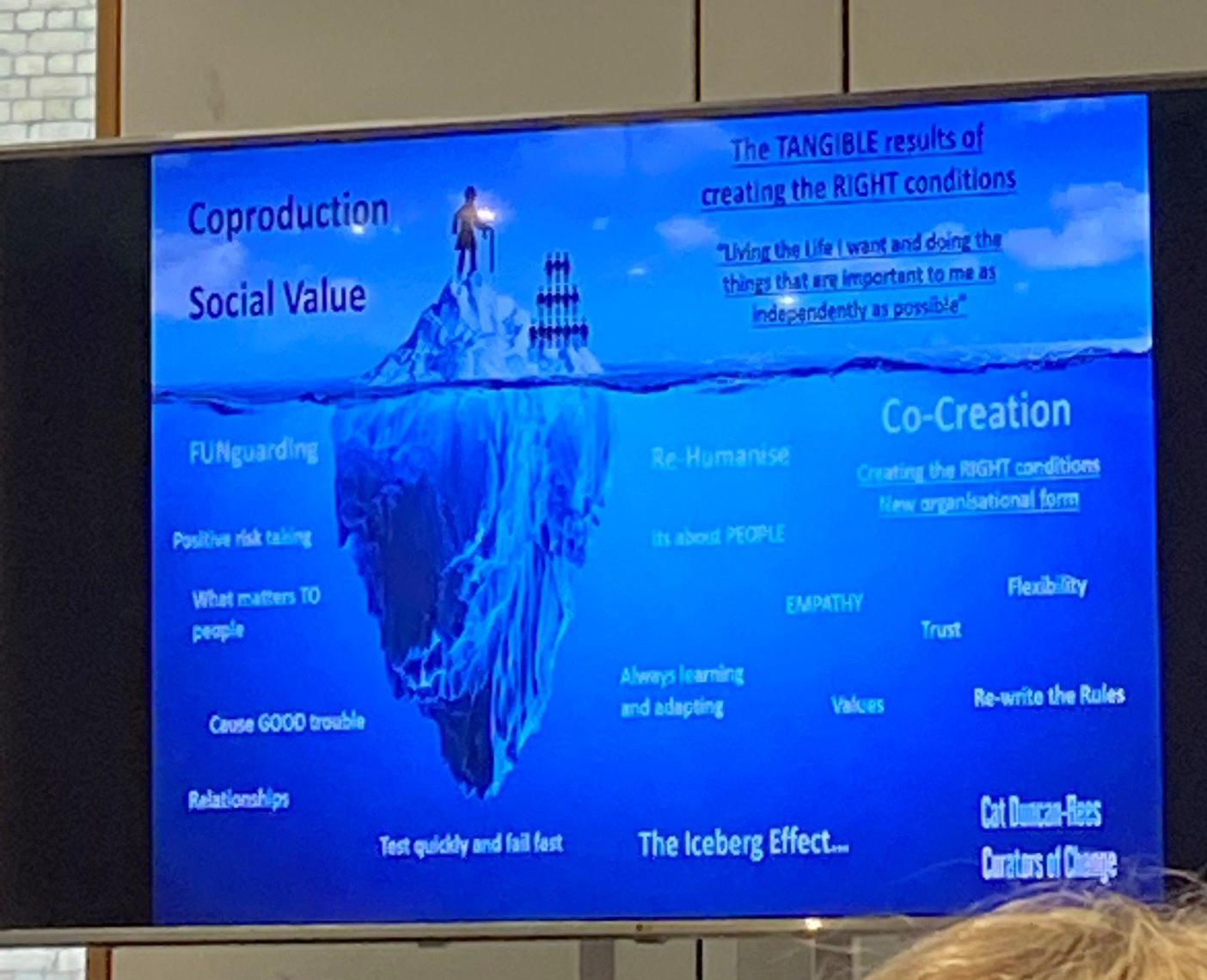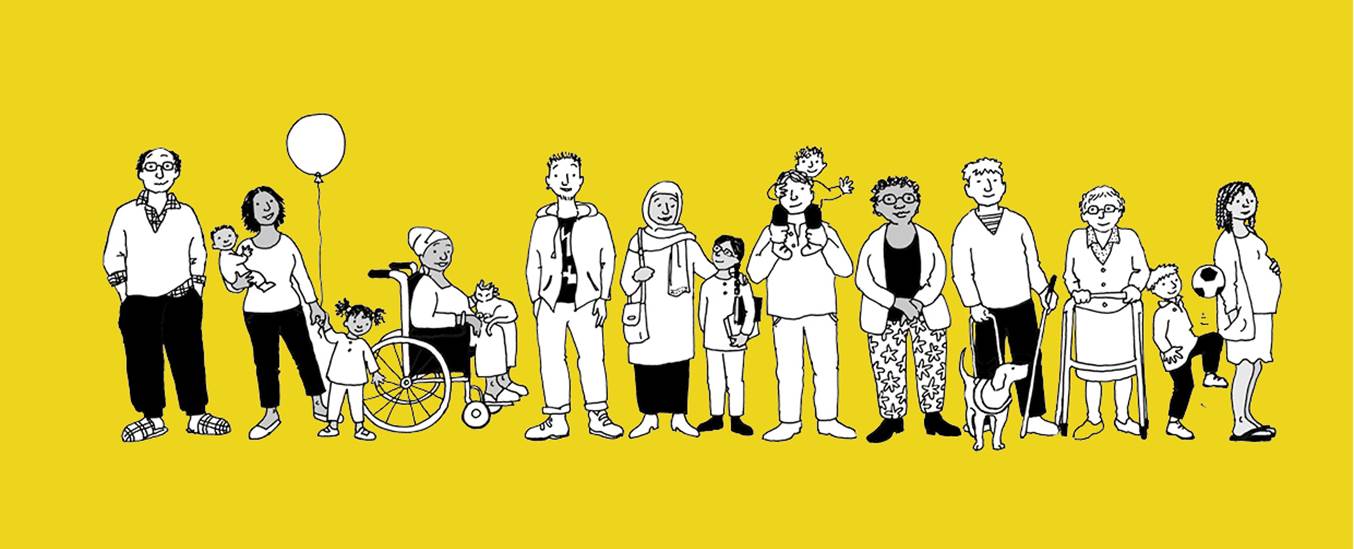APPG Adult Social Care “Making Sure People Have More Control In Their Lives”
29 February 2020
A focus on coproduction and co-creation in care

On Monday we were invited to the All-Party Parliamentary Group on Adult Social Care event themed “Making Sure People Have More Control In Their Lives”.
Here we provide a summary.
What’s an All-Party Parliamentary Group (APPG) anyway?
All Party Parliamentary Groups, or APPGs as they’re more commonly known, are groups of MPs and members of the house of Lords (Peers) who form informal groups which promote, discuss and campaign on particular issues. Whilst they perform an important function of bringing experts, people with lived experience and politicians together on an issue, they have no official status in parliament. There are hundreds of All-Party Parliamentary Groups (see p128 of this document):
CLICK HERE : Register of All-Party Parliamentary Groups Feb 2020
Social care related APPGs include APPG on autism, APPG for disability
and the APPG on social care. On 24th February we were invited to the APPG on adult
social care
event which focused on Co-Production & Co-Design and was chaired by Lord Low of Dalston (Conservative member of the House of Lords) and Labour MP Helen Hayes.
A Personal Story
Sally's top tips for coproduction
For Sally, coproduction is about:
- Trust
- Equality
- Diversity
- Accessibility
- Reciprocity - a message which also came out during our Coproduce Care Chat Podcast with Tina Coldham
- and open minds
Sally also shared with us an image of an iceberg from Cat Duncan-Rees which fabulously illustrates the difference between co-production and co-creation.
Panel 1: “Who decides what my care and support looks like?”
The first panel tackled the question of “who decides what my care and support looks like?”. Unfortunately, there weren't any people with lived experience on this panel but there were plenty of social care advocates including Vic Rayner (Executive Director at the National Care Forum), Kathy Roberts (Chief Executive of the Association of Mental Health Providers), Christine Eade (Manager at The Pod, Coventry City Council), Rachel Mason (Family Carer and Associate Consultant, Self Directed Futures) and Steve Scown (Chief Executive at Dimensions).
“Care should not just be person-centred but person-led care”
Can this be the new slogan for care ?!
The Care Act
As with many of the interviews Coproduce Care has been doing with champions of good care, Christine Eade requested that the sector focuses more on implementing the Care Act 2014
– for Christine, this should be the foundation. Rachel Mason strongly emphasised the impact of community support
in enabling her to be a carer for her son’s. In Rachel’s experience it wasn’t whether care worker supporting her son had qualifications, it was whether they could provide personalised care which was key. Ultimately, personalised care enabled her to reduce paid support.
Question Time
Perhaps the most enlightening part of the afternoon’s talks was when they opened up for questions. One of the first questins came from Dr Jean Hardiman Smith
– Chair of the Health and Care Committee of National Pensioners Convention (NPC). She explained how she heard of a person who had their bank account emptied by a personal carer and that a one size fits all for personalised budgets doesn’t work. Rachel Mason agreed that personal budgets, whilst conceptually sound, put a huge responsibility on the person if managing it themselves.
Another audience member and social care consultant, felt that if people are to take control of their care and support then the Care Act 2014’s eligibility system needs to stop and called for parity of esteem
with the way we access services in the NHS.
There was a notable frustration from the audience with the lack of understanding of Independent Living
and the need to define and inform social care leaders about it. The most enlightening question came from a 69 year old user of services who was also a former planning officer. He reminded us that for over 40 years there has been the disabled person’s movement of ‘Nothing About Us Without Us’.
This audience member was frustrated at the continual medicalisation of people with disabilities and assessments by professionals who, he felt, put people into boxes rather than getting to know them better. He wanted to know why the APPG discussions were not centred around the concept of POWER
and why the term independent living has become a ‘no-no’ and replaced by the ‘nebulous term social care’. He wanted a focus on removing barriers and for everyone to start ‘talking to us and not about us’ (an excellent point!)
This statement fundamentally shifted the direction of the event. Steve Scown led a response from the panel by agreeing. Steve pointed out that “power needs to be placed in the hands of those being cared for”. Vic Rayner responded by stating that social care in fact needs a broader understanding of what it is meant to do.
Finally, Vic pointed out that March 22nd signals the end of the government’s first 100 days in office, a date where the Prime Minister promised cross-party talks for social care
- so watch this space from Boris and #first100days
Panel 2: “How do we make best practice common practice?”
The second panel had the task of discussing “How do we make best practice common practice?”
This panel included Helen Hayes MP
(Co-Chair of the APPG on Adult Social Care) , Andy Tilden (interim CEO of Skills for Care), Issac Samuels
(Member of National Co-Production Advisory Group at TLAP), James Bullion (Vice-President of ADASS), Danielle Conway (Health and Care Worker at Manchester Community Central) and Mario Ambrosi (Director of Communications and Marketing at Anchor Hanover)
Whilst Andy Tilden felt that best practice in organisations is not replicated everywhere and the sector needs to relentlessly look at coproduction and codesign. The one and only user of services (or avoider of services as he described himself!) Isaac Samuels, talked about a rights-based approach to social care and that we have effectively lost the meaning of ‘independent living’. He also called for more transparency in local authority funding decisions asking: who’s overseeing the ‘funding panels’ and how do they work?!
James Bullion had some clear messages for social care:
- The sector should be properly funded “good funding breeds good practice” - £3.5 billion is needed for the sector just stand still.
- Local authorities should be open to challenge from people like TLAP.
- Technology should spread good practice.
- There are some great tools available which local authorities should be using such as TLAP’s and SCIE’s innovation network.
- Contrary to popular opinion, James didn’t feel that the health and social care regulator CQC (Care Quality Commission) should inspect local authorities as they do other services. For James this would be an unnecessary expense
- The language we use to discuss social care and disability isn’t helpful and is fractured
- There should be rights based advise workers
Question Time
During the questions section for this panel, Becky – from Shared Lives Plus
asked Helen Hayes whether she had attended the Social Care Future’s event, where people with disabilities, advocates for the sector and progressive sector leaders discussed the “language” used in our modern discourses of social care. Becky highlighted research being done involving social care futures and carried out by Lancaster University (something Neil Crowther discussed in our up and coming podcast
with him). According to the research so far, using the word ‘crisis’ to discuss the care debate effectively shuts down the conversation. Suggesting that when the sector is described as being in crisis, people feel that it’s effectively a foregone conclusion and nothing else can be done. Becky pleaded to Helen that politicians start talking about other ways of framing social care.
Not quite the short summary we initially intended! But such a thought-provoking discussion and hopefully an informative blog.
Recent Posts

We are pleased to provide an update our involvement in new projects currently being undertaken by Coproduce Care (CIC) in collaboration with Care and Support West. We will be contributing to local initiatives in Social Care Workforce Redesign, and we are excited to share the project with you. This project is running from June 2023 to June 2024. We will be working on three areas for the next 10 months all in the BNSSG region which are as follows: 1: Investigation of the Trusted Assessor Approach in Health and Social Care Systems In this project, we are investigating the Trusted Assessor Approach in health and social care systems. The objective is to demonstrate the value of Trusted Assessors in streamlining care needs assessment, while also addressing data protection and consent concerns. Case studies will be created from local regions that have implemented this approach, to provide insights into the benefits of Trusted Assessors of reducing delays in accessing required care. 2: BNSSG Opportunities for Levy Sharing and Increasing Apprenticeships in Social Care This project aims to identify opportunities for levy sharing in social care and increase the use of apprenticeships. The project will engage social care providers, training organizations, authorities, and other stakeholders to develop strategies, guidelines, and an implementation plan for utilizing the levy effectively and increasing the use of apprenticeships. 3: Integrated Health and Social Care: Enhancing Collaboration, Improving Quality, Shaping Models of Care, and the Future Social Care Workforce In this project, we are evidencing the enhanced collaboration between social care providers, health services, and local authorities. By mapping existing interfaces and collaborations, we seek to identify opportunities for cross-system benefits and improved outcomes, creating recommendations for integration for BNSSG. Our research will provide valuable insights to integration and collaboration between social care and health. At Coproduce Care (CIC), we believe that collaboration and innovation are vital for transforming social care. Through these projects, we aim to contribute to a more efficient and compassionate system. We extend our gratitude to all stakeholders, providers, commissioners, and policymakers for their invaluable support. Thank you for your continued interest in our endeavours. We will keep you updated as the projects progresses! In the meantime, if you are doing any work in any of these key areas, please get in touch with us using the below form. Thank you!

Dear Thérèse Coffey, We wish you the best of luck on your appointment as Secretary of State for Health and Social Care. Coproduce Care (CIC) is a non-profit organisation set up to democratise the social care debate. We support the voices of those working and involved in social care to influence wider decision making in the sector. Through our continued work in this area, we are writing to address some of the urgent needs of our social care workforce. We welcome your plans to set out ‘ Our plans for patients ’ to ensure our population have easier access to NHS and social care services through winter, putting the needs of patients as priority. To ensure we prioritise the health and wellbeing of our populations, and deliver the best, high-quality care possible, we need to ensure we prioritise the needs of our workforce who are at the front of delivering health and social care . To ensure both the health and wellbeing of our population and our social care workforce, we recommend the following: 1. Improving pay for social care workers, in real terms The Kings Fund published a report which compared the pay of social care workers to ten of the largest supermarkets. It found that nine out of ten supermarkets paid more than most social care roles. An example used is that if care worker left their role for a supermarket position at Tesco, they would see a 6.3% pay increase instantly. We have conducted many surveys, webinars, and connected with our audience on what is crucial to improving care workers working conditions and we have found that increasing pay is consistently the most crucial factor in reflecting the value of the work and high stress and responsibilities of the role . With the current cost of living crisis, this need for increasing pay is only getting more urgent. The sector currently has 100,000 vacancies , with extremely high levels of staff shortages. This affects the capacity to deliver services and the quality of care provided . Providers are struggling to recruit staff as they are competing with supermarkets and hospitality, sectors of which offer less stress and responsibility and more pay. We believe care workers are an invaluable part of our society and therefore should be paid accordingly. We recommend: · Introduce national pay scales that ensure care workers meet a real national living wage as a minimum . This will recognise the full contribution of social care workers make to the health of our population, and that their contribution is a real investment into our population. By increasing pay, we further increase recruitment and retention in the sector, and improve the perception of social care being a highly valuable and promising career choice. · Facilitate efforts to develop appropriate distribution of funds. Ensuring the integration and professionalisation of care is fully realised will allow better distribution of funds resulting in higher wages which better reflects the level of skill, qualifications, responsibilities and selflessness required to work within this sector. 2. Professionalising the care system Health and social care should be professionalised to encourage staff retention, career progression and further skill development. Professionalising care work would ensure that those working in the sector are valued and are provided with the necessary tools to provide high quality care. Currently, there is no accredited qualification for social care workers, without a standardised training process. We hosted a live stream with Gillian Keegan , who mentioned the government’s intention to create a voluntary digital care workforce hub, as well as a skill passport for all Health & Social Care workers. This is understood to allow easier identification of the workforce, including the possibility to share resources and opportunities to encourage the workforce to up-skill and develop. The skills passport would help keep track of the skills care workers have demonstrated over time, meaning career progression would be easier to identify . Whilst individual action is very important, to improve the quality of care, we urge for a standardised career and training development program for all care staff that results in an accredited qualification . We recommend: · Adequate pay to restore and recognise social care work as a valued profession . Extensive skills are involved in care work, and if standardised training and qualifications are implemented, security of applicable income is appropriate to these expectations. By increasing pay, care work has higher professional footing as a recognised career and role. · Ensuring the integration of social care is fully realised . The high fragmentation of the care sector and its lack of integration with NHS services makes it challenging to implement standardised training . The governments white paper ‘ Health and social care integration: joining up care for people, places and population ’ seeks the ambition to join up social care services. We welcome this white paper and its integration policy to achieve higher quality of care and better health outcomes. This ambition requires effort and commitment to the integration at all levels, and we hope that as health secretary, fully putting this policy into practice and reaching its scope, goals, and purpose is your focus in your new role. · Implementing standardised training, improved learning outcomes for workers, including IT, literacy, and numeracy training are addressed with sensitivity and with the voices of the workers at heart . Implementing standardised training would ensure a level of professionalism across the sector, however, must go in line with the security of increased income and security of hours of work. We must protect the wellbeing of our workforce, of which is already experiencing burn-out and exhaustion from the high pressures the sector is facing. We cannot have higher expectations of our workers undertaking standardised training without adequate pay . We hope you agree with our recommendations and seek to ensure we continue to improve the working conditions for our social care workforce. We hope that within your post as the new Health and Social Care Secretary, you prioritise the voices of those most impacted by decision making regarding the sector. Thank you for taking the time to read this letter, CoProduce Care Written by: Gabriella Neal














